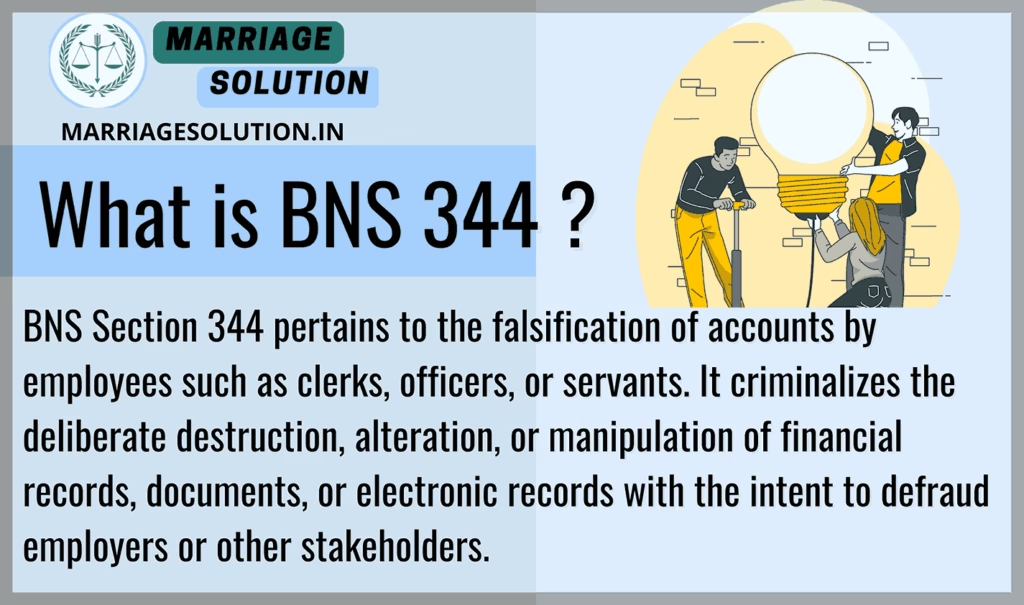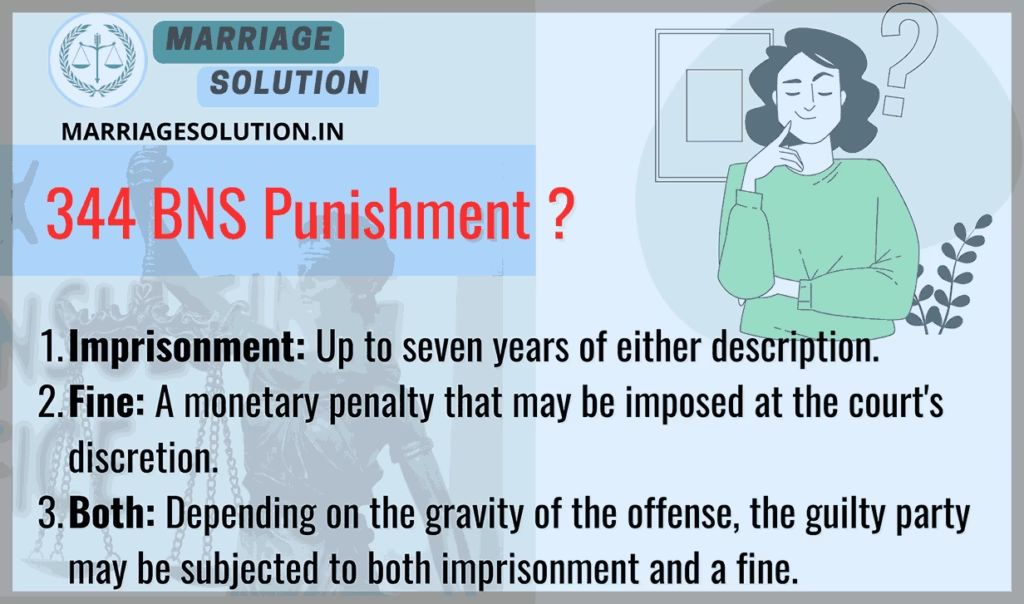Introduction of 344 BNS
344 BNS deals with the falsification of accounts by clerks, officers, or employees entrusted with financial records. It criminalizes deliberate acts such as altering, destroying, fabricating, or making false entries in books or electronic records with the intent to defraud. Replacing IPC Section 474-A, this provision extends to both traditional account books and modern digital records, ensuring transparency in financial management. By targeting dishonest practices within organizations, BNS Section 344 plays a crucial role in protecting employers, investors, and stakeholders from fraud and financial manipulation.
The Bharatiya Nyaya Sanhita (BNS) Section 344 replaces the old Indian Penal Code (IPC) Section 474-A.
What is BNS Section 344 ?
BNS Section 344 pertains to the falsification of accounts by employees such as clerks, officers, or servants. It criminalizes the deliberate destruction, alteration, or manipulation of financial records, documents, or electronic records with the intent to defraud employers or other stakeholders.

Under Section 344 of the bns act 2023
“Whoever, being a clerk, officer, servant, or acting in such capacity, wilfully and with intent to defraud, destroys, alters, mutilates, or falsifies any account, book, electronic record, writing, valuable security, or makes any false entry or omits material information, shall be punished with imprisonment of either description up to seven years, or with fine, or with both.”
(This provision replaces IPC Section 474-A.)
1. Meaning of Section 344
This section punishes the deliberate falsification of financial accounts by employees or persons in positions of trust.
Example → An employee alters company ledgers to cover up embezzlement.
2. Who is Covered?
- Clerks and accountants → Altering invoices or payroll.
- Officers or managers → Manipulating records to hide fraud.
- Any employee in a position of trust → With access to books, accounts, or electronic systems.
4. Essential Ingredients
- Acts covered → Destroying, altering, fabricating, falsifying, or omitting details in accounts or records.
- Includes abetment → Assisting or encouraging others to falsify.
- Covers electronic records → Manipulation of accounting software, payroll systems, or databases.
4. Essential Ingredients
To prove guilt under this section, prosecution must show:
- Accused was a clerk, officer, servant, or similar.
- Act involved falsifying, destroying, or altering records.
- Fraudulent intent to deceive, cheat, or cause harm.
5. Punishment under BNS Section 344
- Imprisonment → Up to 7 years.
- Fine → As decided by the court.
- Both → Depending on severity of the offence.
6. Legal Classification
- Bailable → Accused can seek bail.
- Non-cognizable → Police need court permission to investigate.
- Non-compoundable → Cannot be settled privately.
- Trial by → Magistrate of the First Class.
7. Examples of BNS Section 344 in Action
- Example 1 – Altering Business Records
An accountant manipulates purchase records to show inflated expenses and pockets the difference. - Example 2 – Tampering with Payroll
A payroll clerk adds a fake employee in the system to siphon off salaries.
8. Importance of BNS Section 344
- Protects employers from dishonest employees.
- Ensures financial integrity and transparency.
- Covers both physical and electronic records.
- Builds trust in business, auditing, and regulatory systems.
Section 344 BNS Overview
BNS 344 is a legal provision addressing fraudulent practices by individuals employed to manage accounts or records. It aims to protect employers and ensure the integrity of financial systems by penalizing actions such as forging, altering, or destroying critical records.
BNS Section 344: Falsification of Accounts
1. Applicability of the Section:
This section is applicable to individuals who are employed as clerks, officers, servants, or in a similar capacity, entrusted with managing financial records or accounts. It specifically targets those who manipulate records with fraudulent intent while acting within the scope of their professional duties.
2. Nature of the Offense:
Falsification of accounts includes the deliberate destruction, alteration, mutilation, or fabrication of books, electronic records, or documents. It also includes making false entries or omitting critical information from such records, directly or through abetment.
3. Inclusion of Digital Records:
The section explicitly covers electronic records, reflecting the relevance of modern technology in business and financial practices. Any tampering with electronic records, including accounting software or databases, is treated as falsification.
4. Intent to Defraud:
Fraudulent intent is central to this offense. The act must be committed with the intention to deceive, even if no specific individual or monetary amount is named. A general intent to harm the integrity of records is sufficient for prosecution.
5. Scope of Documents:
The documents affected may include books, writings, valuable securities, electronic records, or accounts. These may belong to the employer or be held in the employee’s custody for professional purposes.
6. Punishment:
The offense is punishable by imprisonment of up to seven years, a fine, or both. The severity of the punishment depends on the nature and impact of the falsification on the organization or parties involved.
7. Legal Classification:
The offense is non-cognizable, meaning that police cannot initiate an investigation without prior approval from the court. It is also bailable, allowing the accused to seek bail, and triable by a Magistrate of the First Class.
8. Non-Compoundable Nature:
The offense is classified as non-compoundable, meaning that the complainant and the accused cannot settle the matter mutually. Once the case is filed, it must proceed through the legal process.
9. Protection of Employer Interests:
This section safeguards employers from dishonest employees who might compromise financial integrity. It emphasizes accountability among individuals entrusted with the responsibility of handling financial records.
10. Importance in Financial Regulations:
BNS Section 344 serves as a critical provision in maintaining transparency and trust within professional environments. By penalizing fraudulent practices, it helps uphold the integrity of businesses and protects stakeholders from financial harm.
Examples
Example 1: Altering Business Records
An accountant in a small trading company falsifies purchase invoices to show higher costs, diverting the difference into personal accounts. The intentional manipulation of company records with fraudulent intent constitutes an offense under BNS Section 344.
Example 2: Tampering with Digital Accounts
A payroll officer manipulates employee records in the organization’s payroll system to add a fictitious employee and transfers the salary to their bank account. This act of altering electronic records for personal gain is a clear violation of BNS Section 344.
BNS 344 Punishment
- Imprisonment: Up to seven years of either description.
- Fine: A monetary penalty that may be imposed at the court’s discretion.
- Both: Depending on the gravity of the offense, the guilty party may be subjected to both imprisonment and a fine.

BNS 344 bailable or not ?
BNS 344 is a bailable offense, meaning the accused has the right to seek bail and avoid being held in custody until trial.
Bharatiya Nyaya Sanhita Section 344
| Section | Offense | Punishment | Bailable / Non-Bailable | Cognizable / Non-Cognizable | Trial By |
|---|---|---|---|---|---|
| BNS Section 344 | Falsification of accounts by clerks, officers, servants or persons in similar capacities — destroying, altering, fabricating or making false entries in books/electronic records with intent to defraud. | Imprisonment up to 7 years, or fine, or both. | Bailable | Non-cognizable | Magistrate of the First Class |
| IPC Section 474-A (Old) | Falsification of accounts by clerks, officers, servants or persons in similar capacities (old IPC provision covering deliberate tampering with employer’s books/records). | Imprisonment up to 7 years, or fine, or both. | Bailable | Non-cognizable | Magistrate of the First Class |
BNS Section 344 FAQs
What is the main focus of BNS Section 344?
BNS Section 344 focuses on preventing and punishing the falsification of financial or electronic records by employees entrusted with managing their employer’s accounts.
Who can be charged under BNS 344?
Any clerk, officer, servant, or person acting in such capacity who alters, destroys, or manipulates financial records with the intent to defraud can be charged under this section.
What is the punishment for falsification of accounts under BNS 344?
Punishment includes imprisonment of up to seven years, a fine, or both, depending on the severity of the offense.
Is BNS 344 a bailable offense?
Yes, BNS 344 is a bailable offense, allowing the accused to seek bail.
What type of trial is conducted under BNS Section 344?
Cases under this section are tried by a Magistrate of the First Class.
What documents are covered under BNS 344?
The section applies to books, electronic records, writings, valuable securities, and accounts belonging to or handled on behalf of an employer. It also covers omissions and alterations in these records.
Conclusion
BNS Section 344 serves as a strong deterrent against fraudulent manipulation of financial accounts. By punishing employees who tamper with physical or electronic records, it safeguards employer trust, maintains business transparency, and strengthens accountability in financial systems. The law prescribes punishment of up to seven years of imprisonment, a fine, or both, with offences classified as bailable and non-cognizable, ensuring fairness while addressing financial crimes seriously. In today’s era of digital accounting and electronic records, this section remains vital in preventing fraud and protecting the integrity of India’s financial and business ecosystem.
Need Legal Support?
If you are dealing with court cases, marriage problems, or any other legal issue, our team at Marriage Solution – Lawyer Help is here for you. Simply fill out our quick online enquiry form, and we’ll connect you with the right legal expert to support your needs.
Finished with BNS 344 ? Continue exploring the next provisions of the Bharatiya Nyaya Sanhita (BNS), 2023. Each section includes explanations, examples, and plain-language breakdowns for easy understanding.
- 345 BNS : Property mark .
- https://marriagesolution.in/bns_section/345-bns/
- 346 BNS : Tampering with property mark with intent to cause injury .
- https://marriagesolution.in/bns_section/346-bns/
- 347 BNS : Counterfeiting a property mark.
- https://marriagesolution.in/bns_section/347-bns/
- 348 BNS : Making or possession of any instrument for counterfeiting a property mark.
- https://marriagesolution.in/bns_section/348-bns/
- 349 BNS : Selling goods marked with a counterfeit property mark .
- https://marriagesolution.in/bns_section/349-bns/
Full IPC Section List: https://marriagesolution.in/ipc-section-list
All Indian Law & Blogs: https://marriagesolution.in/indian-law/
Full BNSS Section List: https://marriagesolution.in/bnss_section-list
